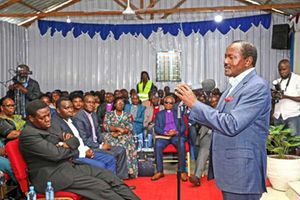Develop sports to employ young people

Harambee Stars striker Dennis Oliech during a past training session. Oliech was on March 24, 2016 unveiled as the official band ambassador of online betting firm betway. PHOTO | FILE |
What you need to know:
- Having a large working population is good for a country’s economy since it provides a large labour pool and enhances productivity.
- The government has demonstrated commitment to promoting sports talent by creating a policy and institutional mechanisms.
- Mainstreaming sports in the national development agenda provides the critical mass to unleash participation in national development.
Many countries in the developing world are grappling with what has been termed the youth bulge. This is where the majority of the country’s population comprises young people between the ages of 18 and 35.
It is estimated that 60 per cent of the population of countries such as Rwanda, Kenya, and Uganda falls in this bracket.
Having a large working population is good for a country’s economy since it provides a large labour pool and enhances productivity.
However, it is also fraught with risks, particularly if the majority of the youth cannot find jobs. Crime and political instability are often cited as direct consequences of high unemployment rates. With unemployment in Kenya currently at 10 per cent, there is an urgent need to address the challenges posed by this rapidly growing segment of the population.
Since not every man or woman will eventually secure a white-collar job or successfully start a business, we need to explore other avenues of tapping the diverse skills and talents hidden among the thousands entering the workforce every year.
This entails crafting policies, partnerships, and programmes that focus on tapping the vast repository of upcoming talent in fields such as sports, culture, and the arts.
Though often neglected and under-utilised, sports can play an instrumental role in creating employment opportunities while at the same time offering a legitimate and potentially lucrative career for ambitious individuals. With sports having evolved into the multi-billion-dollar enterprise it is today, the opportunities are limitless.
Fortunately, Kenya is a global sports powerhouse reputed for the prowess of its athletes. Equally notable is the progress made in integrating sports in national development. Vision 2030 — Kenya’s development road map — identifies sports as a potential catalyst for the country’s social and economic transformation.
PROMOTING SPORTS TALENT
The government has demonstrated commitment to promoting sports talent by creating a policy and institutional mechanisms. The National Youth Policy seeks to boost participation in the economy while defining the State’s obligations to individuals looking to start their careers. The Sports Act, enacted in 2013, provides a legal framework for promoting the development of sports.
Mainstreaming sports in the national development agenda, therefore, provides the critical mass to unleash participation in national development. It also provides a platform for people to develop their talent and engage in constructive activities, thus curbing crime and other undesirable behaviour.
The government, however, cannot do everything alone. In other words, policies should translate into programmes to have the desired impact. To this end, private sector and other actors need to chip in with ideas and resources. This entails not just pumping money into sports, but also working with stakeholders at the national and local levels to develop viable ways of identifying, nurturing, and promoting sporting talent.
Such initiatives already exist and have proved successful in unlocking talent. International Kenyan footballers such as Dennis Oliech are beneficiaries of such programmes. This is evidence that with the right mix of policies, resources, and knowledge, such initiatives can have a positive impact on sports development.
A rapidly growing population requires opportunities to actualise individual and collective potential and this can only happen by spotting and nurturing rising talent. In a nutshell, sports should not just be viewed as a recreational activity to occupy idle youth but also as a vehicle to positively shape careers and lives.
That way, we will reap the dividends of the youth bulge and not have to worry about the time bomb it could otherwise become.
Ms Gikonyo is the Betway Kenya country manager




